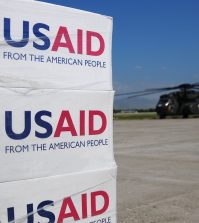Zimbabwe applies to re-join Commonwealth

Zimbabwe has formally applied to re-join the Commonwealth after a 15-year absence.
The move, which was announced by the Commonwealth Secretariat (CS) last Monday, is the country’s latest step towards re-engaging with the international community after strongman Robert Mugabe was ousted by the army in November last year.
President Emmerson Mnangagwa made the proposal in a letter to secretary-general Patricia Scotland dated Tuesday 15 May, in which he also invited the 53-member international organisation to observe Zimbabwe’s upcoming elections.
“Zimbabwe’s eventual return to the Commonwealth, following a successful membership application, would be a momentous occasion, given our shared rich history,” Baroness Scotland said in statement released by the CS.
Reconciliation
Zimbabwe joined the Commonwealth on achieving independence in 1980 but was suspended by the group in 2002 for breaching the 1991 Harare Commonwealth Declaration: a statement on the group’s shared core values agreed, ironically enough, in Zimbabwe’s own capital city. Accused of using widespread violence and electoral fraud to win the 2002 presidential election, Mugabe formally quit the Commonwealth in 2003 following its refusal to lift the suspension.
To re-join, Zimbabwe has to demonstrate that it complies with the fundamental values set out in the Commonwealth Charter, including the protection of democracy, the rule of law and human rights such as freedom of expression, the CS said.
“The membership process requires an informal assessment to be undertaken by representatives of the secretary-general, followed by consultations with other Commonwealth countries,” it said, adding that the secretariat is now mobilising a team of election observers, whose findings will form part of the secretary-general’s informal assessment.
Next big test
The elections, which are due to be held in July, include presidential, parliamentary and local ballots.

Commonwealth Secretariat, secretary-general Baroness Patricia Scotland said that Zimbabwe’s return to the Commonwealth would be a “momentous occasion” (Image courtesy: An-d & Virtualstuart/Wikipedia).
“I urge the government, opposition parties, the election management body, civil society, and all stakeholders to play their part in ensuring a credible, peaceful and inclusive process that restores citizens’ confidence, trust and hope in the development and democratic trajectory of their country,” Baroness Scotland said.
Re-joining the Commonwealth is expected to boost access to international investment and aid for Zimbabwe, which is still subject to some US and European Union sanctions. British foreign secretary Boris Johnson said last month that the UK would back the country’s readmission to the group, subject to reforms including free and fair elections.
The Gambia re-joined the Commonwealth in February this year after pulling out in 2013 and South Africa re-joined in 1994, while suspensions were lifted on Pakistan and Fiji in 2008 and 2014 respectively.





















